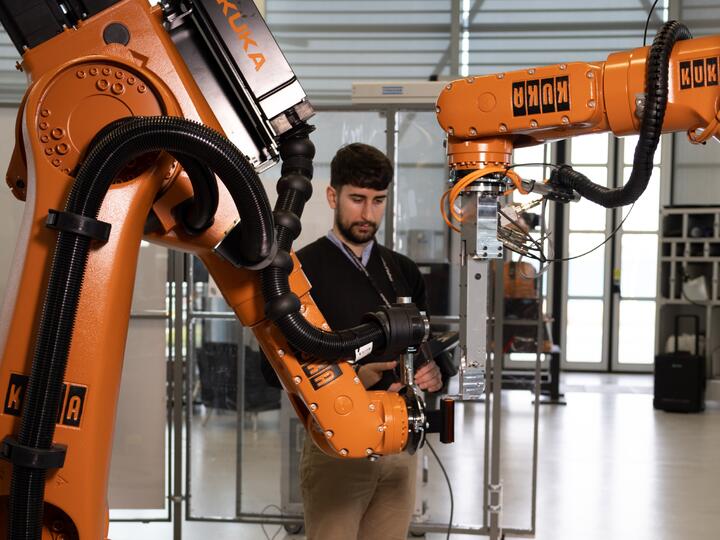A £1.7m electrification research passes half-point with promising outcomes
06 November 2023AMRC engineers are developing new manufacturing solutions for production and assembly of electric motors, as part of a seven-year research programme to help bring UK manufacturing to the forefront of the electrical revolution.
Article featured in the latest issue of the AMRC Journal.
The University of Sheffield Advanced Manufacturing Research Centre (AMRC) is one of the collaborating research institutes on the EPSRC-funded Future Electrical Machine Manufacturing (FEMM) Hub programme that aims to develop new manufacturing techniques and technologies to improve the reliability, performance and efficiency of high value electrical machines, which recently passed the midpoint of the programme.
As part of the wider FEMM Hub programme, the research team at the AMRC flagship Factory 2050 facility is working on two research projects. The AMRC has successfully produced an electric motor component using remote laser cutting technology that’s three times faster than its conventional counterpart; and is testing robotic winding that allows greater coiling flexibility for more efficient motors.
Lloyd Tinkler, AMRC senior technical fellow for electrical machines, said: “Electrification is central to the AMRC’s future propulsion core research theme, and the FEMM Hub has given us the opportunity to tap into expertise in the electrical machines research community with the Hub acting as a central point from which we’ve now built a large portfolio of activity across the whole AMRC.”
The trend for increasing speed and operating frequency in electric machines is driving a push towards thinner laminations in the stator and rotor core, which presents manufacturing challenges to conventional processes such as stamping or laser cutting without causing degradation in mechanical or magnetic properties.
The AMRC has developed a novel remote laser cutting process for electrical steels, from experimental proof of concept by other researchers to producing a complete laminated stator core. The technology is up to three times faster than conventional laser cutting, with the potential to tune process parameters to avoid damaging the steel properties.
Remote laser cutting had previously been demonstrated on a representative stator tooth geometry (c. 50 mm x 50 mm). Dr Alexei Winter, AMRC technical lead in electrical machines, has led research that builds on previous laboratory demonstrations, creating a bespoke remote laser cutting system that is capable of producing 600 mm x 600 mm parts using a 2 kW laser scanned at up to 8 m/s, and overcoming manufacturing challenges such as cleanliness of the optics and handling thin-gauge electrical steel sheets, to produce hundreds of laminations for a full stator.
The stator demonstrated the inherent flexibility of laser cutting to allow each lamination to be customised, such that when stacked, it approximates three-dimensional features such as radii, chamfers or holes which could incorporate additional functionality into the stator core. This stator is currently being wound and prepared for testing in the Electrical Machines and Drives Group at the University of Sheffield.
As part of the other research strand, Gianmarco Pisanelli, AMRC technical lead for novel robotics, has developed robotic coil winding as a more flexible alternative to conventional winding machines, using the large working volume and dexterity of the robots to accommodate a wide variety of coils.
He said: “The research demonstrates the precision winding of coils to maximise the fill factor, i.e. the number of copper wires placed within the slot, and has quantified the influence of friction in the needle and wire tension pulling the robot from its planned trajectory.
“The ongoing research focuses on compensating for these effects to minimise fluctuations in wire tension which could influence the quality of the resulting coil.”
Last year, Pisanelli presented his work to an audience of industrial leaders in the field of coil winding and machine manufacture at the Coil Winding, Insulation, Electrical Machine Exposition (CWIEME) in Berlin, one of the largest industrial events in the world.
FEMM Hub director Prof Geraint Jewell said: "I'm delighted that the quality of research and the impact that our work under FEMM Hub is having has been commended by the mid-term review panel. We have many strands of research on electrical machine manufacture on-going across the consortium with real momentum, and the innovative work on next generation laser cutting coil winding being undertaken at the AMRC is one of the highlights."
In 2019, the AMRC received a £1.7m grant from the Engineering and Physical Sciences Research Council (EPSRC) for research to establish credible manufacturing solutions for the production and assembly of electric motors. The AMRC is hosting the majority of FEMM Hub’s capital investment at Factory 2050, part of which has seen two winding robots and a remote laser cutting facility established. Apart from the £1.7m funding, the Hub also kick-started a portfolio of electrification projects , worth £2m.
About FEMM Hub:
FEMM Hub is a £28m, seven-year programme, which began in 2019 and is core-funded by the Engineering and Physical Sciences Research Council (EPSRC) with supporting contributions from a range of industry partners.
The programme focuses on research that addresses key manufacturing challenges in the production of electrical machines, motors and generators for high value sectors, such as aerospace, renewable energy and automotive.
The hub is a consortium of five research groups from three institutions: the University of Sheffield’s AMRC and the Electrical Machines and Drives (EMD) group from the Department of Electronic and Electrical Engineering; and the Department of Automatic Control and Systems Engineering (ACSE); the Electrical Power group at Newcastle University; and the University of Strathclyde’s Advanced Forming Research Centre (AFRC), part of the National Manufacturing Institute Scotland.

